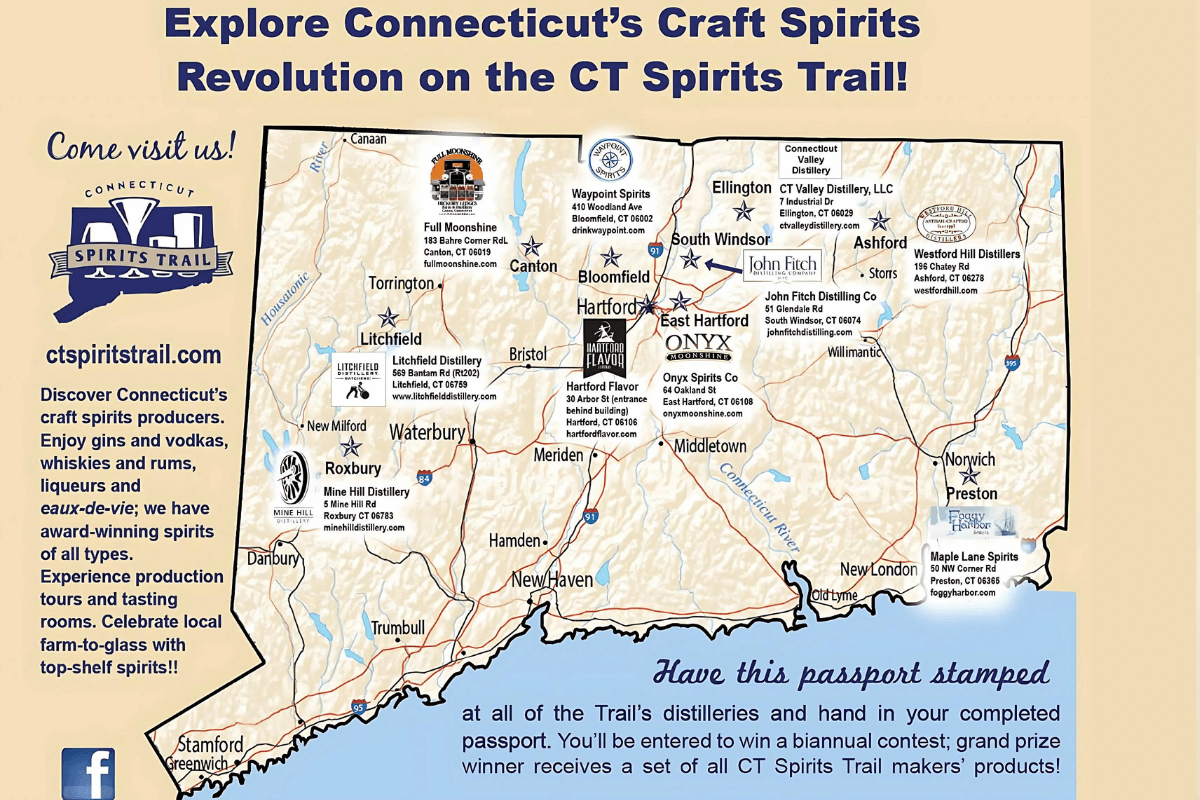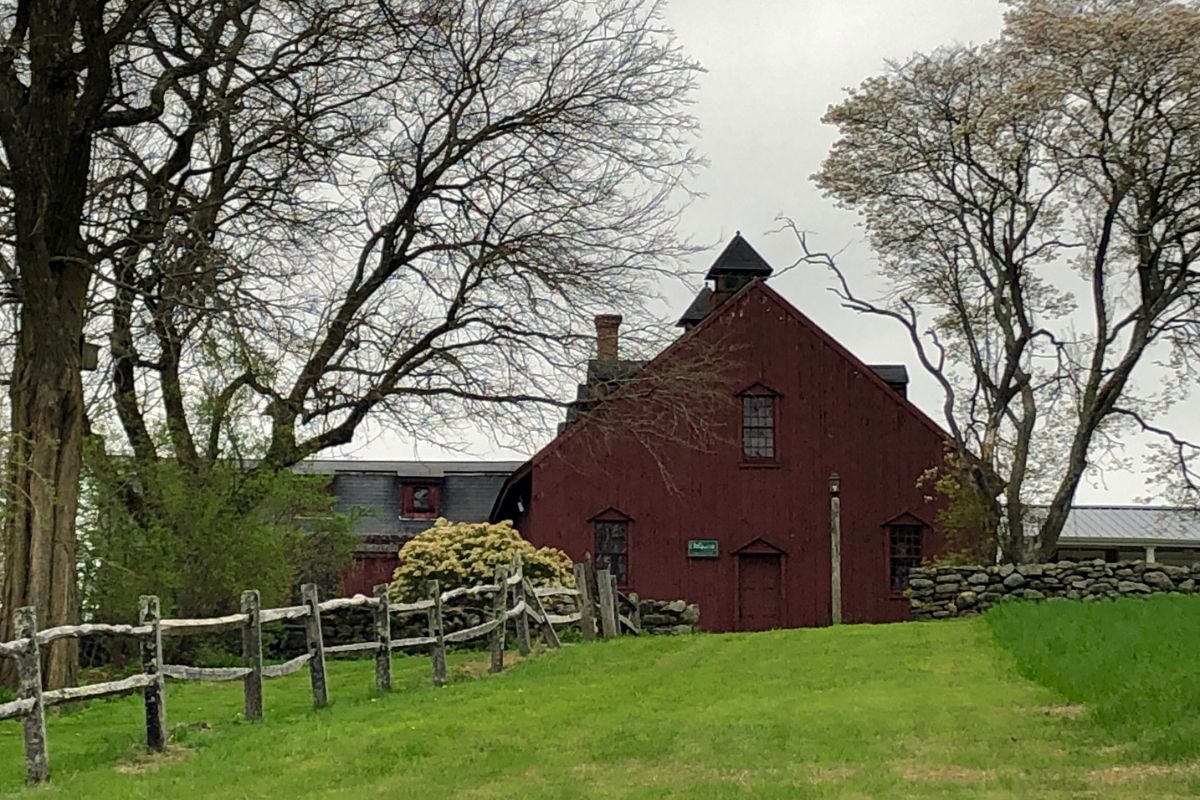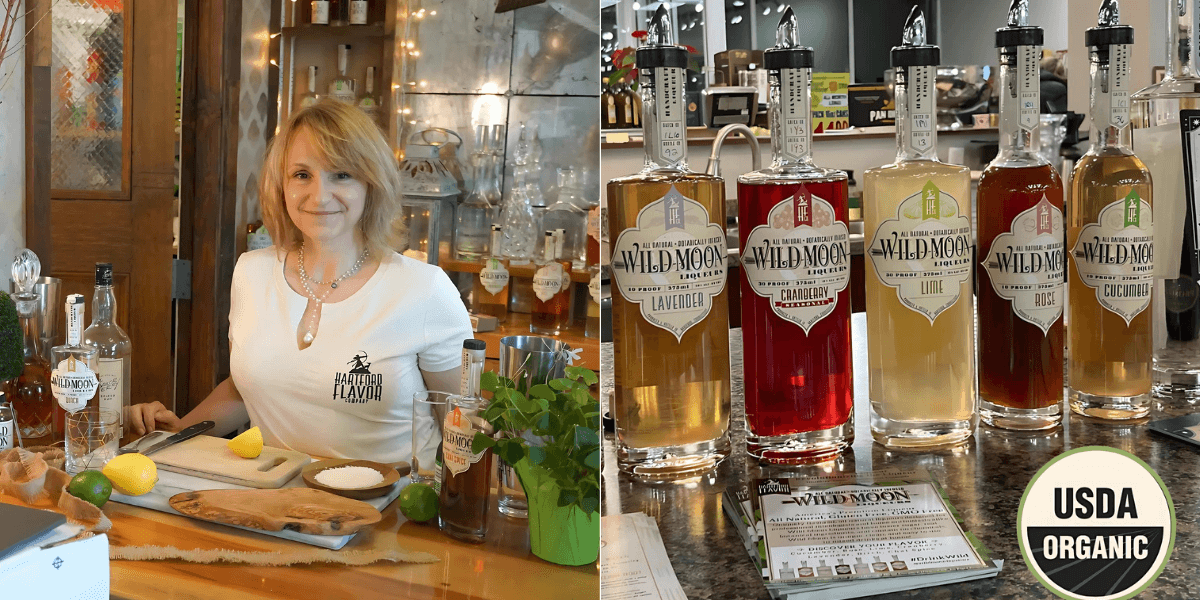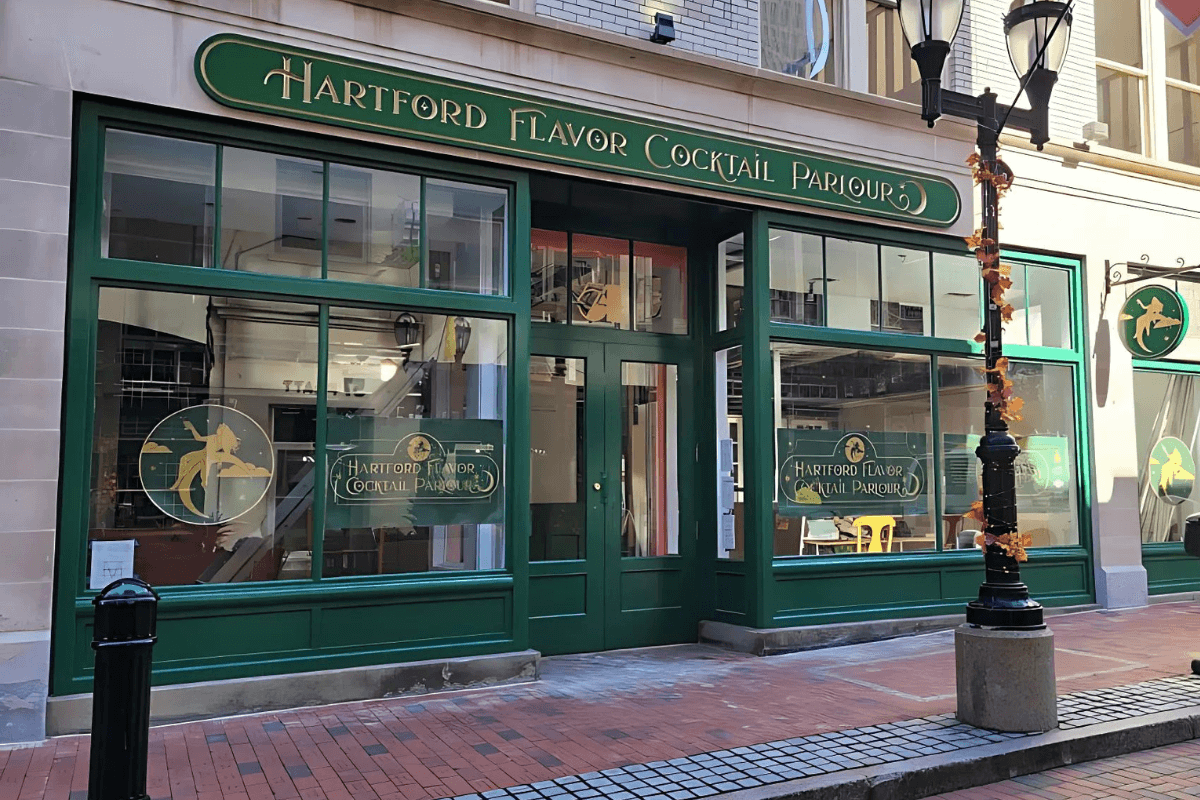
07/10/2024 From farm to flask: the rise of Connecticut’s craft distilling industry.
Connecticut's craft spirits scene is experiencing a renaissance, with the sustained efforts of Tom Dubay, President of the Connecticut Spirits Trail and CEO of Hartford Flavor Company. Under his leadership, a "local-is-better" philosophy has blossomed, with distillers embracing Connecticut’s rich agricultural bounty to create distinctive, flavorful spirits. From locally grown cucumbers that elevate Hartford Flavor's Wild Moon Liqueurs to innovative practices like using spent beer in distilling, Dubay is at the forefront of celebrating Connecticut's natural resources and making it a notable name in craft distilling. In this interview, Tom shares his journey, the challenges and triumphs of building the Spirits Trail, and his vision for the future of Connecticut’s craft distilling industry.
The Connecticut Spirits Trail showcases local distillers throughout the state. Could you tell us about the vision behind the Trail and how it has evolved since its inception? How do you see it shaping the future of the craft spirits industry in Connecticut?
The initial idea behind the trail was for marketing and legislative issues. We made progress on marketing aspects before Covid which then interrupted momentum so we put more emphasis on the legislative efforts.

Image: Connecticut Spirits Trail passport; Source: CT Spirits Trail.
The Trail highlights the importance of locally grown crops and a "local-is-better" mentality. How have Connecticut’s distillers embraced this philosophy? Could you share examples of innovative practices by producers on the Trail that exemplify Connecticut's unique spirit?
Our CT distillers have utilized locally grown wheat, corn, vegetables, and fruits within our spirits. Also, one distillery has even used spent beer as a way to develop a spirit product. Within our products, we utilize CT-grown cucumbers (for our Wild Moon Liqueurs Cucumber expression) as we sourced cucumbers from all over the continent and fiercely concluded that our local cucumbers are far superior in our finished product. We also use locally grown Sour Cherries from a sustainable garden/orchard within one of Hartford's municipal parks (Keny Park, which was designed by Hartford native son Frederick Law Olmsted who is the designer of Central Park in NYC and countless other famous parks).
Craft spirits tourism has become increasingly popular. How does the Connecticut Spirits Trail enhance the visitor experience, and what impact has it had on local tourism? Are there any plans to expand or promote the Trail further?
Each of our CT distilleries provides a unique visitor experience and our settings range from urban distilleries (Hartford Flavor Company and SoNo1420 in South Norwalk) to rural/farm settings like Woodford Hills Distillery in Ashford, which is one of the 15 oldest craft distilleries in the US).

Image: Woodford Hills Distillery in Ashford, CT.
What are some of the key advocacy initiatives the Connecticut Spirits Guild is pursuing on behalf of the state's distillers? How are you working with state and local government to ensure favorable conditions for the growth of the industry?
We have worked with the CT Legislature to expand what distilleries in CT can offer visitors. Over the past 10 years, we worked to open up laws to allow for tasting room bottle sales, selling cocktails by the glass via a CT Craft Cafe permit, bottle sales at CT Farmers Markets, and the ability for a distillery owner to be the permittee of a restaurant apart from the distillery property).
What are the most pressing challenges currently facing Connecticut's distilling industry, and how are local producers navigating these obstacles? Are there specific regulatory or market issues that are of particular concern?
The largest obstacle is the inability to do direct-to-consumer shipping (this is a bit more of a federal issue but states are instituting state-level laws to encourage craft distilleries to get products in a compliant manner to fans across state lines). Excise taxation is always something that small distilleries struggle with at both the state and federal levels.
[[relatedPurchasesItems-31]]
With the rise in popularity of craft spirits, what steps is the Connecticut Spirits Guild taking to support the growth and sustainability of smaller distilleries across the state?
We continue to hone our wish list with the Legislature and one of our top items is the ability for a satellite tasting room (with bottle sales) apart from the actual distillery. We would love to be able to have a distillery or multiple distilleries be able to do so in places where seasonal tourism traffic is highest (the CT shoreline in the summer, the Litchfield Hills in the fall foliage season, etc.).
Hartford Flavor Company has been a trailblazer with your unique botanical liqueurs. What was the inspiration behind Wild Moon Liqueurs, and how have you seen consumer interest in botanical and natural spirits evolve since you launched the brand?
The inspiration for our liqueurs was that my wife, who is also a sustainable landscape designer and the creator of our products, became sensitive to gluten, additives, and preservatives in both food and beverage products. She created a few homemade liqueurs out of personal necessity so she could once again enjoy a cocktail at home. We were invited to a holiday party near our home and so Lelaneia brought a couple of liqueur bottles as a hostess gift.
At that party, a few industry members were present and after tasting the liqueurs implored her to get them to market. A year-plus later, Wild Moon Liqueurs were launched to the public. The public response was immediately strongly positive and over our 10-year timeline the liqueurs continue to be well received. We subsequently launched a vodka line as well and had the distillery officially receive USDA organic certification back in 2019.

Image: (From Left) Lelaneia Dubay and Wild Moon Liqueurs - Hartford Flavor Company (USDA Organic Certified Distillery).
Wild Moon Liqueurs stands out with its emphasis on natural ingredients and unique flavors. Could you share a bit about your creative process? How do you go about selecting ingredients, and what is your approach to developing new flavors?
With the organic certification, our mission is to produce the cleanest spirit possible so as to promote a "healthier" alternative to many spirits and liqueurs in general. The liqueurs are infused with strong flavor profiles from the actual botanical ingredients, which are always as fresh and of high quality as possible. We also place a strong emphasis on water quality and have installed a very unique filtration system that has elevated the quality of our products. The filtration system strips out unwanted minerals, adds wanted minerals, and re-clusters the hydrogen molecules so as to create a charged or more "alive" water akin to the world's finest mountain spring waters. As a botanist, Lelaneia is constantly pursuing unique flavors and flavor combinations across our products. The liqueurs are designed with ample flavor to drive the flavor of cocktails, rather than melt away when mixed with other ingredients. This allows mixologists and home enthusiasts alike to make interesting, delicious cocktails ranging from 2 or 3 ingredient drinks to complex, high-end creations.
How is Hartford Flavor Company integrating sustainable practices into your distilling process? Are there any innovative environmental initiatives you are particularly proud of?
Beyond the organic certification, we are proud of our reuse of materials within our processes and the composting of thousands of pounds of spent botanical ingredients that a local food composter is able to create soil from thereby reducing methane gas contributions.
What are your growth plans for both Hartford Flavor Company and the Connecticut Spirits Trail in the next five years? Are there any new markets, products, or partnerships that excite you?
Hartford Flavor Company has recently launched (this summer) a full restaurant concept in downtown Hartford. It is called Hartford Flavor Cocktail Parlour and is a farm-to-table/sea-to-table culinary concept with a cocktail program that features our spirits. We will continue to add to our vodka line and possibly introduce some botanical gins. We are also contemplating an expansion of our distillery, which could entail a larger urban setting or a rural/farm setting. We hope to see more CT distilleries across the state and we will do all we can to facilitate that growth as well.

Image: Hartford Flavor Cocktail Parlour; Source: Hartford Flavor Company.
Looking ahead, what do you envision for the future of craft distilling in Connecticut? How do you see the state's distillers continuing to differentiate themselves on the national and global stage?
We are hopeful for a continued state and federal legislative landscape that will allow our distilleries to survive and thrive within the industry. We imagine that our distillers will continue to produce high-quality, innovative products that delight consumers both near and far. CT has always been an innovative, ingenious place and so we "cheers" to that!
Conclusion:
As Tom Dubay continues to amplify the voice of Connecticut's craft distilling community, his passion for local ingredients, sustainable practices, and innovative spirit shines through. The Connecticut Spirits Trail shows his vision of creating a thriving industry rooted in authenticity, quality, and a sense of place. Hartford Flavor Company's journey, from its humble beginnings to becoming a key player in Connecticut's spirits landscape, reflects a broader trend of embracing local heritage and craftsmanship. With plans to expand, introduce new products, and further enhance the visitor experience, Tom Dubay’s work is set to impress drinks enthusiasts, one bottle at a time. Cheers to a future where Connecticut spirits continue to rise, inspiring drinkers both near and far.
In conversation with Malvika Patel, Editor and VP, Beverage Trade Network
Also Read:
John Granata: from Mastering Distillation to Leading the New Jersey Craft Distillers Guild
Navigating the Spirit Trail of Paso Robles with Aaron Bergh
Distilling Success: A Conversation with David Cohen, President of the FCSA



